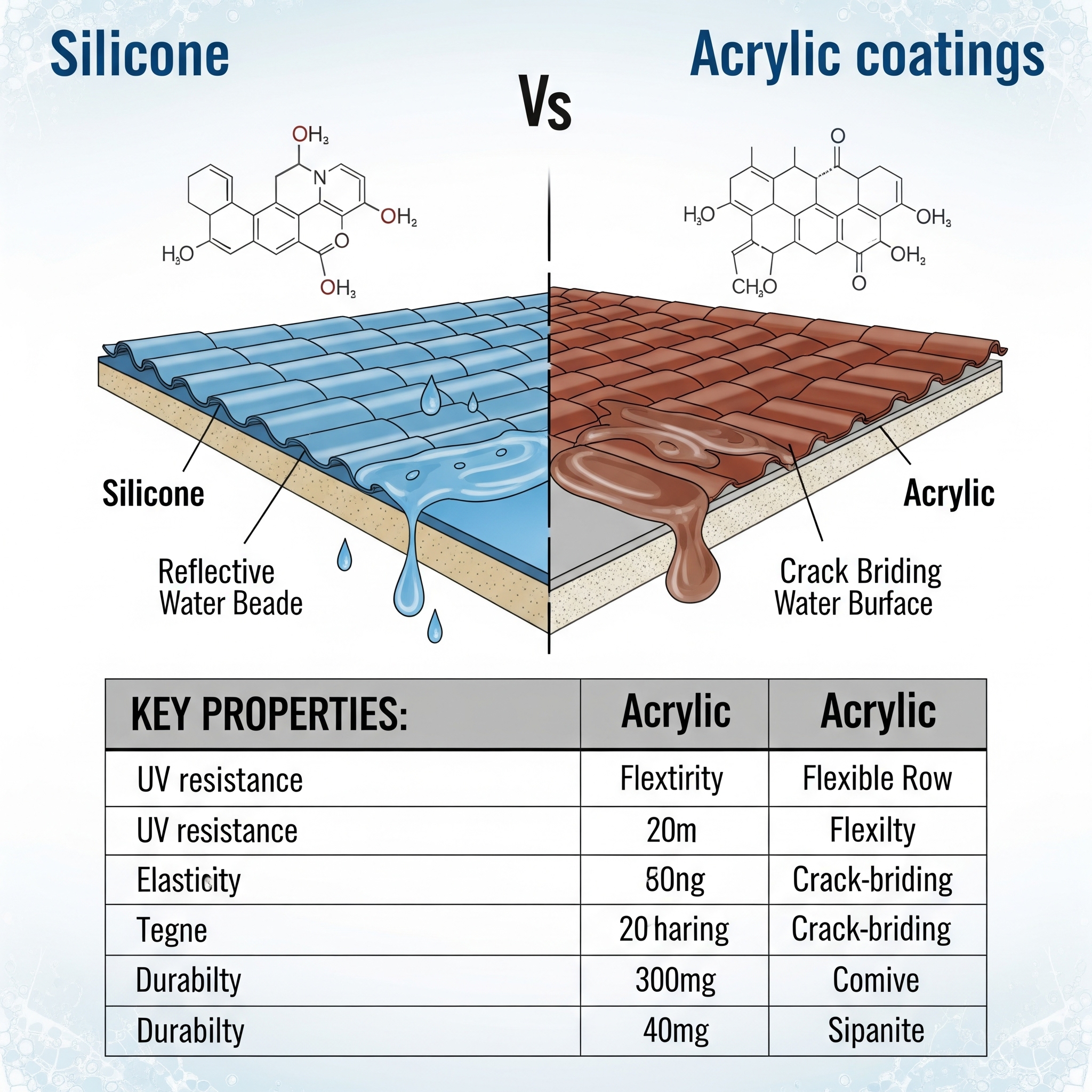If your commercial flat roof needs restoration, a roof coating can be a smart, cost-effective way to extend its life and improve performance—without a full replacement. But not all coatings are created equal. Two of the most common systems are silicone and acrylic roof coatings.
So, how do you choose between silicone and acrylic roof coatings?
At Boundless Roofing & Chimney, we’ve applied hundreds of coating systems on buildings throughout New Jersey. Below, we compare both products to help you determine the best option for your commercial roof’s needs, climate, and budget.
Why Roof Coatings Matter
Roof coatings are liquid-applied membranes designed to restore aging roofs, stop leaks, and reflect UV rays. They’re ideal for:
-
Flat or low-slope commercial roofs
-
Building owners wanting to delay full replacement
-
Improving waterproofing and energy efficiency
-
Minimizing downtime during repairs
But choosing the right coating type—silicone vs acrylic—can significantly affect the performance and longevity of your roof.
Overview: Silicone vs Acrylic Roof Coatings
| Feature | Silicone | Acrylic |
|---|---|---|
| Waterproofing | Excellent (even with ponding water) | Moderate (not ideal for ponding areas) |
| Reflectivity | High (up to 90%) | High (up to 85%) |
| UV Resistance | Superior | Good to Excellent |
| Durability | More resistant to weather and moisture | Can degrade faster in standing water |
| Adhesion | Bonds well to most surfaces | May need primer for some substrates |
| Cost | More expensive per gallon | Lower upfront cost |
| Application Conditions | Requires dry surface; cures well in humidity | Requires ideal weather to avoid wash-off |
| Maintenance | May attract dirt, reducing reflectivity | Easier to recoat, stays cleaner |
| Recoatability | Requires special prep | Easy to recoat without stripping |
Advantages of Silicone Roof Coatings
1. Superior Waterproofing
Silicone is the best choice for roofs with ponding water issues. It maintains its integrity even after weeks of exposure to standing water.
2. Long-Lasting UV Resistance
Silicone resists UV degradation better than acrylic, making it ideal for buildings with high sun exposure.
3. Flexible in Harsh Conditions
Silicone coatings remain flexible in extreme temperatures—perfect for New Jersey’s seasonal weather, including freezing winters and humid summers.
Disadvantages of Silicone
-
Attracts dirt, which may reduce reflectivity over time unless cleaned
-
Harder to recoat—requires abrasion or primer before reapplication
-
More expensive up front than acrylic
-
Slippery surface when wet (not ideal for foot traffic without added grit)
Advantages of Acrylic Roof Coatings
1. Cost-Effective and Eco-Friendly
Acrylic coatings offer excellent value, especially for large roof areas. They are water-based, low-VOC, and more environmentally friendly.
2. Highly Reflective and Energy-Efficient
Acrylic coatings can reflect up to 85% of solar radiation, helping lower building cooling costs in warm months.
3. Easy to Apply and Maintain
Acrylic coatings are simple to apply and can be recoated without heavy prep, making long-term maintenance easier.
Disadvantages of Acrylic
-
Vulnerable to ponding water—can blister or peel if water sits for more than 48 hours
-
Curing issues in cold or wet conditions—should only be applied in dry, warm weather
-
Shorter lifespan than silicone (often 5–10 years compared to 10–20 for silicone)
When to Choose Silicone
Choose silicone if:
-
Your roof experiences regular ponding water
-
You want maximum waterproofing and UV resistance
-
The roof is in poor condition, and you want long-term protection
-
You prefer low-maintenance with strong performance
Common use cases:
-
Large warehouse or industrial flat roofs
-
Old roofs with ponding issues
-
Areas with intense sun exposure and limited drainage
When to Choose Acrylic
Choose acrylic if:
-
Your roof has good drainage and minimal ponding
-
You need a budget-conscious solution
-
You plan to recoat every 7–10 years
-
You’re restoring a low-slope roof with high visibility
Common use cases:
-
Office buildings, schools, or low-traffic commercial roofs
-
Roofs where cost-efficiency and reflectivity are priorities
-
Projects requiring quick reapplication or short-term enhancement
Expert Tip: Consider a Hybrid System
In some cases, a hybrid approach works best—such as applying silicone in ponding zones and acrylic on sloped areas. Boundless Roofing & Chimney can evaluate your roof layout and recommend the best material plan based on function and ROI.
Professional Installation Matters
No matter which coating you choose, success depends on expert application. We offer:
-
Full roof inspections and moisture scanning
-
Substrate repair and prep
-
Manufacturer-approved coating systems
-
Coating-specific warranties (up to 20 years)
📞 Call Boundless Roofing & Chimney at 973-960-7921
📩 Or get your free commercial roof coating estimate
We proudly serve commercial property owners across New Jersey with flat roof expertise you can trust.
Final Thoughts
Both silicone and acrylic roof coatings offer unique benefits—but the right choice depends on your roof’s condition, drainage, budget, and long-term goals. At Boundless Roofing & Chimney, we help you make the right investment and ensure flawless application.
Let us help you protect and extend the life of your flat roof—without the cost and disruption of a full replacement.

